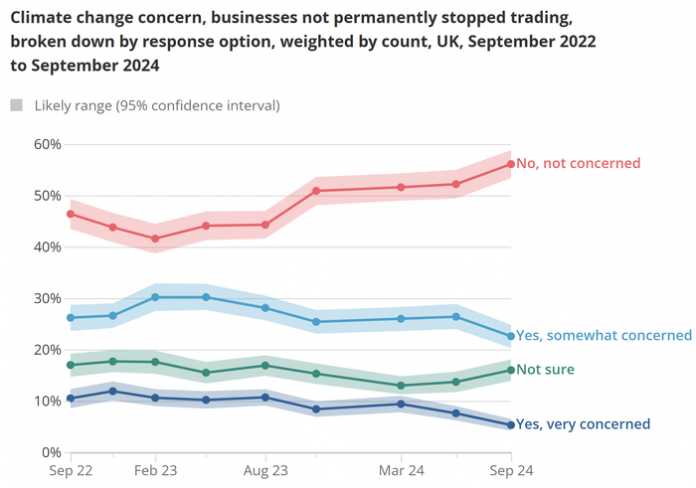By Samuel Abel, Founder of Eden Greenspace:
The latest Office for National Statistics data assessing Public and business attitudes towards climate change show a sustained trend that the majority of adults (57%) in Great Britain consider climate change and the environment as important issues. This trend is even more pronounced in adults working in professional occupations (67%) and more affluent areas (61%).
Yet business attitudes do not follow this trend, with only one third of businesses expressing concern about climate change. The research found that three-quarters (74%) of businesses had not assessed any climate risks, and only 26% had a net zero target in place.
The lack of concern among businesses puts them out of touch with their customers, creating risks to brand image, customer satisfaction and employee retention. So what are some of the actions being taken by the companies most concerned about climate?
One of the first steps a business can take is to measure its carbon footprint. Although larger companies face mandatory measurement and reporting standards, for many smaller businesses this still remains a voluntary step.
This ‘carbon accounting’ process is essential as it enables businesses to understand the scale of their carbon emissions. The second crucial step is for the company to set net zero targets. This involves setting milestones for it to reduce its emissions, ultimately down to zero, by 2040 or 2050. Then, businesses can then take steps to reduce a small amount of its emissions gradually, year on year until it reaches the target.
Perhaps the most reputable voluntary guidelines for target-setting and decarbonising in this area come from the Science Based Targets Initiative (SBTi), which provides guidance on net zero. Its list of adherents recently exceeded 10,000 companies and financial institutions setting some form of target.

However, companies increasingly face two major challenges on their net zero journey. The first is that there is a limit to how much a company can decarbonise year on year, and many emissions remain leftover, known as ‘residual emissions’.
Luckily, the SBTi provides very clear guidance on this: companies must “remove carbon from the atmosphere and permanently store it” in order to ‘neutralise’ their residual emissions. They also strongly recommend supporting initiatives the support nature restoration, given that the global degradation of nature is also a major contributor to climate change.
So there are two sides to the net zero coin. The first is decarbonisation, and the second is neutralising residual emissions. When it comes to the latter, non-profits such as Eden Greenspace are well positioned to help them fund high quality climate projects to neutralise their emissions.
Eden provides access to highly effective climate projects whose main aim is to remove additional carbon or reduce existing carbon emissions, such as peatland restoration, solar lighting or tree planting. But these projects also have benefits on nature and reducing pollution more broadly, helping companies to fulfill the SBTi requirements.
In short, projects like these help companies to take responsibility for their residual emissions, while supporting nature restoration work at the same time.

However, setting net targets is not the only way in which companies can show leadership on climate. In fact, in the 2024 UK Net Zero Business Census, which surveyed thousands of UK SMEs, respondents reported that ‘organisational reputation’ was their main motivation to complete net zero, rather than regulation.
This should not come as a surprise: sustainability and brand are inextricably linked, and businesses understand that funding one strengthens the other. For example, the Winkworths estate agents recently partnered with Eden Greenspace to enable all its branches to fund climate and nature projects upon the completion of a house sale, as part of their fee.
By enabling property vendors to plant 10 trees in the Midlands or remove 5kg ocean plastic in Cornwall when their sale went through, Winkworth was demonstrating their sustainability credentials in a way that impressed customers and helped improve their sales volume, as well as doing something good for the environment.
Undoubtedly, climate action is a big challenge for any business, large or small. The good news is that there are numerous resources and organisations providing solutions to this challenge. Done properly, climate action can be a positive force for change that can even help, rather than hinder, a business’ brand and reputation.




















